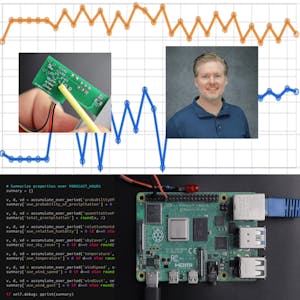This specialized course equips beginners to build functional prototypes, home projects, and custom creations using a Raspberry Pi. It covers everything from setting up a Raspberry Pi to designing and fabricating printed circuit boards for custom hardware.
Learn how to build network-connected projects, troubleshoot high-speed signals, integrate sensors, and design physical electronics hardware using open-source software.
Certificate Available ✔
Get Started / More Info
This course consists of four modules, covering topics such as building network-connected projects, troubleshooting high-speed signals, integrating sensors, and designing physical electronics hardware using open-source software.
In Course 1, learn to use a Raspberry Pi 4 to build network-connected projects with sensors and motors, and access them from your smartphone. Gain foundational knowledge in embedded systems, programming, and electronics without any prior experience assumed.
Course 2 delves into the physics of high-speed signals, exploring signal protocols, signal integrity, and designing circuits to ensure high-speed signals work effectively. Gain insights into troubleshooting and designing projects for optimal performance.
Course 3 focuses on integrating sensors with a Raspberry Pi, covering core concepts and techniques in designing and interfacing analog sensors, calibrating sensors, reducing noise, and post-processing data in Python. Learn to build highly customized sensors for your applications.
Course 4 applies knowledge gained in the first three courses to build physical electronics hardware. Gain proficiency in circuit simulation, schematic entry, PCB layout, and 3D CAD modeling using free and open-source software.
Battery Technologies is a comprehensive Specialization focusing on various battery types, their applications, and management in electric vehicles scenarios.
Digital Systems: From Logic Gates to Processors provides a practical insight into modern digital system design, focusing on the system rather than the supporting...
This course offers the opportunity to design and build a mobile surveillance system using Internet of Things principles. Gain practical experience and apply knowledge...
This course provides a comprehensive guide to writing text-based requirement statements, following the INCOSE guidelines. It is suitable for individuals in various...